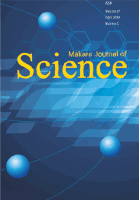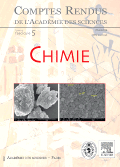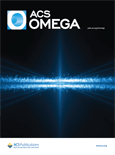
Macedonian Journal of Chemistry and Chemical engineering
Scope & Guideline
Driving Innovation in Chemical Research and Practice
Introduction
Aims and Scopes
- Sustainable Chemistry and Engineering:
The journal emphasizes research aimed at sustainable practices within the chemical industry, including the development of eco-friendly materials and processes, as evidenced by papers on smart textiles and environmentally-friendly extraction methods. - Electrochemistry and Analytical Techniques:
A significant portion of the journal's output is dedicated to electrochemical studies and analytical methodologies, highlighted by numerous papers focusing on voltammetry and electrochemical sensors. - Medicinal and Biological Chemistry:
The journal features studies on the synthesis and characterization of bioactive compounds, particularly those with potential medicinal applications, such as Cu(II) complexes and the biological activity of natural extracts. - Nanotechnology and Material Science:
Research involving nanomaterials, including their synthesis, characterization, and applications, is prominently featured, indicating a strong focus on the intersection of chemistry with nanotechnology. - Computational Chemistry:
The journal includes studies employing computational methods to explore chemical phenomena, such as corrosion inhibition and molecular docking studies, showcasing a blend of theoretical and experimental approaches.
Trending and Emerging
- Sustainability and Green Chemistry:
Recent publications highlight an increasing focus on sustainability, with studies aimed at developing eco-friendly materials and processes, such as smart textiles and the use of natural extracts in various applications. - Integration of Machine Learning and Data Science:
There is a growing trend towards utilizing machine learning and multivariate analysis in chemical research, particularly for predictive modeling and rapid screening in pharmaceutical preformulation studies. - Nanomaterials and Their Applications:
Research on nanomaterials, including their synthesis and applications in biosensors and drug delivery systems, is on the rise, reflecting the growing interest in nanotechnology within the chemical sciences. - Electrochemical Biosensors and Sensors Development:
The development of advanced electrochemical sensors, particularly those based on metallic nanoparticles and nanocomposites, is increasingly prominent, indicating a trend towards practical applications of electrochemistry in diagnostics and environmental monitoring. - Pharmacological and Medicinal Chemistry Research:
The journal is observing an uptick in studies focused on the pharmacological potential of chemical compounds, including investigations into their biological activities and interactions, reflecting a robust intersection between chemistry and life sciences.
Declining or Waning
- Traditional Organic Synthesis Techniques:
There seems to be a decrease in papers focused solely on traditional organic synthesis methods, as more emphasis is placed on sustainable and innovative synthetic routes, such as microwave-assisted and green chemistry approaches. - General Chemistry Education:
Research specifically aimed at chemistry education, while still relevant, appears to be less frequent. This may indicate a shift towards more applied and research-driven articles rather than pedagogical studies. - Conventional Chemical Analysis Methods:
There is a noticeable reduction in the publication of studies employing conventional analytical techniques without the integration of newer technologies, such as machine learning or advanced electrochemical methods.
Similar Journals

Makara Journal of Science
Advancing knowledge across diverse scientific disciplines.Makara Journal of Science, published by UNIV INDONESIA, is an esteemed open-access journal that has been contributing to the field of scientific research since 2007. With an ISSN of 2339-1995 and E-ISSN of 2356-0851, this journal plays a crucial role in disseminating knowledge across various disciplines including Agricultural and Biological Sciences, Biochemistry, Genetics and Molecular Biology, Chemistry, Materials Science, and Physics and Astronomy. The journal operates out of Depok, Indonesia, and aims to foster international collaboration and bridge the gap between theory and practice through high-quality research publications. As of 2023, it holds a Q3 ranking in Agricultural and Biological Sciences and Q4 in several other categories, reflecting its steady growth and dedication to quality. Researchers, students, and professionals can access a wealth of pioneering studies that not only deepen understanding in their respective fields but also broaden interdisciplinary dialogue within the global scientific community. Join your peers and contribute to the ongoing discourse in this vital area of scientific exploration.

JOURNAL OF THE CHEMICAL SOCIETY OF PAKISTAN
Elevating Chemical Scholarship for a Brighter Future.JOURNAL OF THE CHEMICAL SOCIETY OF PAKISTAN is a premier academic journal published by the Chemical Society of Pakistan, focusing on advancing the field of chemistry through rigorous research and scholarship. Established in 1996, this journal aims to disseminate high-quality research articles, reviews, and insights pertaining to various subfields of chemistry, making substantial contributions to both local and international scientific communities. With a current impact factor placing it in the Q4 category, the journal continues to foster discussions on emerging trends and innovations within the discipline. Additionally, it holds a Scopus rank of #305 out of 408, highlighting its growing influence despite being positioned in the 25th percentile. Although it is not an open-access journal, it provides a crucial platform for researchers and professionals in Pakistan and worldwide. The JOURNAL OF THE CHEMICAL SOCIETY OF PAKISTAN serves as a valuable resource for students, educators, and industry professionals alike, facilitating the exchange of knowledge and promoting advancements in chemical sciences.

JOURNAL OF CHEMICAL RESEARCH
Elevating Chemistry: A Platform for Groundbreaking Studies.JOURNAL OF CHEMICAL RESEARCH, published by SAGE PUBLICATIONS LTD, serves as a pivotal platform for scholars and practitioners in the field of Chemistry. With its ISSN 1747-5198 and E-ISSN 2047-6507, this journal has established itself as a reliable source of innovative research since its inception in 2000. The journal's comprehensive scope encompasses various facets of chemical research, providing a broad spectrum of articles that foster scientific advancement and technological innovation. Ranked in the Q3 tier of miscellaneous chemistry journals in 2023, with a Scopus rank of #246 out of 408, it represents a solid outlet for emerging and established researchers alike. Although currently not an open-access journal, its rigorous peer-review process ensures that only high-quality studies are published, catering to the academic and professional community's demand for credible and impactful findings. Positioned in the vibrant research landscape of the United Kingdom, the JOURNAL OF CHEMICAL RESEARCH is dedicated to expanding the frontiers of chemical sciences and is an essential resource for anyone committed to advancing this dynamic field.

Eurasian Chemico-Technological Journal
Bridging Disciplines for a Sustainable Chemical FutureEurasian Chemico-Technological Journal, published by the Institute of Higher Education Academy of Sciences in Kazakhstan, serves as a dynamic platform for scholars and professionals engaged in the interdisciplinary fields of chemical engineering, chemistry, condensed matter physics, and materials science. Since its inception in 1999, the journal has embraced an open access model, enabling broad dissemination of research findings and fostering collaborative innovation across borders. With an ISSN of 1562-3920 and a converged publication schedule extending from 2007 to 2024, it continues to contribute to the global academic dialogue, despite its current standing in Q4 quartiles across several categories on Scopus. The journal ranks in the lower percentiles within its respective fields, yet it remains a valuable resource for emerging research and perspectives within the scientific community. This journal is essential for both seasoned researchers and students, as it reflects the evolving landscape of chemico-technological research while promoting engagement with contemporary issues in the sciences.

COMPTES RENDUS CHIMIE
Empowering Scientists with Open Access to Essential Knowledge.COMPTES RENDUS CHIMIE, published by the prestigious Académie des Sciences in France, stands as a significant journal in the fields of chemistry and chemical engineering. With an ISSN of 1631-0748 and an E-ISSN of 1878-1543, this open-access journal has been committed to disseminating high-quality research since its transition to open access in 2020. Featuring a diverse array of studies, the journal covers innovative research trends and applications, while maintaining a Q3 category ranking in both Chemical Engineering (miscellaneous) and Chemistry (miscellaneous) as of 2023. Its Scopus rankings, positioning at #251 out of 408 in general chemistry and #169 out of 273 in general chemical engineering, highlight its growing impact within the scientific community. Authored by a global cohort of scientists and researchers, COMPTES RENDUS CHIMIE is dedicated to the advancement of knowledge and sharing insights that are vital for ongoing research and development in the chemical sciences. Located in the heart of Paris at 23 Quai de Conti, 75006, France, the journal is an essential resource for those passionate about chemistry and engineering disciplines, fostering collaboration and innovation across the world.

CHEMICAL RESEARCH IN CHINESE UNIVERSITIES
Navigating the Landscape of Chemistry ResearchCHEMICAL RESEARCH IN CHINESE UNIVERSITIES is a prominent academic journal dedicated to the dissemination of high-quality research in the field of chemistry and related educational methodologies. Published by HIGHER EDUCATION PRESS, this journal has established itself as a vital resource for researchers and professionals looking to stay at the forefront of chemical sciences. With an impressive impact factor and ranked in the Q2 quartile for both Chemistry and Education categories, it highlights significant advancements while maintaining rigorous peer-review standards. The journal's ISSN is 1005-9040 and its E-ISSN is 2210-3171, ensuring broad accessibility to its global readership. Although it does not offer open access, its contributions are vital to understanding the dynamics of chemistry research and education within and beyond China. With converged publication years from 1999 through to 2024, CHEMICAL RESEARCH IN CHINESE UNIVERSITIES continues to be an essential platform for innovative studies and critical discussions in the expanding realm of chemistry.

JOURNAL OF THE INDIAN CHEMICAL SOCIETY
Illuminating India's Contributions to Global Chemical ResearchJournal of the Indian Chemical Society, published by Elsevier, stands as a cornerstone in the field of chemistry, particularly representing the rich chemical research emanating from India.
With a significant history dating back to its establishment, this journal encompasses diverse disciplines including Drug Discovery, Electrochemistry, Inorganic Chemistry, Organic Chemistry, and Physical and Theoretical Chemistry, reflecting the evolving landscape of chemical sciences.
Despite being positioned in the Q3 category across multiple quarters, the journal demonstrates promising rankings in various chemistries, highlighting its commitment to advancing the knowledge and application of chemical sciences. While currently not available as an open access journal, the Journal of the Indian Chemical Society is dedicated to providing a platform for high-quality research that fosters innovation and collaboration among researchers, professionals, and students worldwide.
With its continuous publication from 1973 to the present, it serves as an essential repository for cutting-edge findings and developments in chemistry, striving to connect academia with industry and practice.

Chemical Engineering Journal Advances
Pioneering Open Access Research for a Sustainable Future.Chemical Engineering Journal Advances, published by Elsevier, is a premier open-access journal dedicated to advancing research and innovation in the field of chemical engineering. With its inception in 2020, the journal has quickly established itself as a key player in disseminating high-quality, peer-reviewed articles, boasting an impressive Q1 ranking in Chemical Engineering and related disciplines for 2023. The journal covers a broad spectrum of topics, including industrial processes, environmental chemistry, and innovative manufacturing techniques, making it essential reading for researchers and professionals aiming to stay at the forefront of chemical engineering advancements. With its commitment to open access, Chemical Engineering Journal Advances ensures that groundbreaking research is readily available to the global scientific community, fostering collaboration and knowledge exchange. Situated in the Netherlands, the journal supports its authors with a robust platform for impactful research dissemination, highlighted by a solid position in the Scopus ranks, indicating its influence and relevance in the field.

BMC Chemistry
Elevating Chemical Science with Impactful ResearchBMC Chemistry, published by BMC, is a reputable open access journal that has made significant strides since its inception in 2019. Operating under e-ISSN 2661-801X, this journal is dedicated to advancing the field of general chemistry by promoting high-quality research across various sub-disciplines. Headquartered in the United Kingdom, BMC Chemistry boasts a commendable impact factor and is classified in Q2 within the prestigious field of Chemistry (miscellaneous) according to the 2023 category quartiles. The journal's Scopus ranking places it at #139 out of 408 in its category, highlighting its growing relevance and influence in the academic community, with a commendable 66th percentile standing. With a commitment to open access, BMC Chemistry ensures that groundbreaking discoveries and innovative research are available to a global audience, fostering collaboration and development in chemistry. Researchers, professionals, and students alike will find this journal to be an invaluable resource for disseminating knowledge and driving scientific advancement.

ACS Omega
Catalyzing Collaboration for Global Scientific Progress.ACS Omega is a prominent open-access journal published by the American Chemical Society that has been serving the global research community since its inception in 2016. With ISSN 2470-1343, it focuses on a wide array of topics within the realm of Chemistry and Chemical Engineering, making it a crucial platform for researchers and practitioners aiming to disseminate significant findings across these disciplines. The journal maintains an impressive standing, ranking in the Q2 quartile for both Chemical Engineering and Chemistry categories, highlighting its impact and relevance in contemporary research. Additionally, with its Scopus ranks placing it within the top 24% and 27% of General Chemistry and General Chemical Engineering respectively, ACS Omega continues to foster innovation and facilitate collaboration among scientists. As an Open Access journal, it ensures that research outputs are freely available to all, enhancing the accessibility and visibility of contributors’ work, thus playing a critical role in advancing scientific knowledge globally from its headquarters in Washington, D.C.